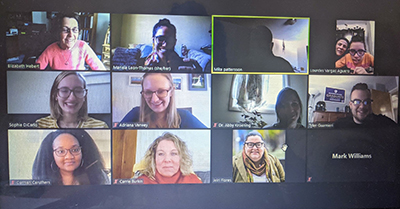A Fellow's Perspective: Virtual Opportunities through Rochester LEND's Collaborations in Central America
April 28, 2021

|
It has been more than a year since we started adapting to the "new conditions" of living in a world with the COVID-19 pandemic. Transitioning from face-to-face to all-virtual interactions was not as much fun as the option of "working and studying from the bedroom" sounded. Not only did we start missing familiar faces, but we had to limit new relationships to connections traveling through router devices and Zoom platforms.
Despite these limitations, the pandemic has triggered a virtual realm of opportunity. It has challenged our creativity and our passion to keep pursuing the visions and missions we sought out in "normal" times. It invited us to think outside the box and has extended connectivity and networking beyond local boundaries. The 2021 LEND cohort has experienced this firsthand.
I am a fellow in the Rochester LEND and I am new to the culture and the city. I was eager to meet the new people from different disciplines that comprised my LEND cohort. Prior to LEND, I started my career in Physical Therapy at Universidad de Costa Rica. I have always been motivated to challenge the social stigma associated with disability, at home and abroad. Throughout my career, I have focused on building relationships and connections with families in my home country, Costa Rica, as well as local and regional organizations throughout Central America. I pursued my master's in Social Work at Nazareth College in Rochester, to help integrate my interests in physical and social aspects of health. Being a LEND fellow has given me the opportunity to bridge my background in Physical Therapy and Social Work, with the common focus of disability studies.
In Rochester, LEND fellows typically participate in an interdisciplinary activity called the "arena evaluation," which involves interdisciplinary teams working with local families, who have a child with a disability. The teams work together across disciplines to share information and offer recommendations to families, based on their requests and needs. In the past, LEND fellows have gotten this opportunity to meet local people-- families and organizations--with whom they work toward a common goal. This year our cohort did not have the typical arena experience.
Having an atypical year has not been all negative. This year, our arena evaluation looked very different from in the past. Instead of "meeting" local families through this activity, virtual technology allowed me to reconnect with families, community members, and organizations in Costa Rica and Honduras. With the help of LEND speech and occupational therapy faculty, we organized an international arena evaluation. Our interdisciplinary teams worked with families and organizations in Central America, significantly extending impact beyond local and national boundaries, and also teaching fellows to work across cultural boundaries.
One group worked with a Costa Rican family and explored life stage transitions for their son with autism and Down Syndrome. This group collaborated with the family to create a "Behavioral Intervention Toolkit" and an "Individualized Support Plan for Education and Employment". This family looks forward to using these tools to advocate for themselves, and also to inform and empower other local families in Costa Rica.
Another arena group collaborated with Special Olympics, Costa Rican partners, who were committed to developing a "Behavioral Tool Guide" for parents of athletes with autism. In partnership with the Director of Young Athletes in Costa Rica, LEND fellows and faculty provided information about tools from the perspective of nursing, audiology, physical therapy, occupational therapy, social work, dentistry, public health, and pediatrics.
The final two groups, worked with a school (Amigos de Jesus), and an NGO (Guala: Manos en Acción). Both of these organizations serve people with disabilities in Honduras and were seeking out interdisciplinary consultation.
Although "typical" features of life have been interrupted, and have made many of us feel uncomfortable and pessimistic about missing opportunities that existed before the pandemic, the truth is that there are other ways to look at it. This new era of technology offers novel opportunities to learn across cultures from one another. Working across national boundaries can bring together people and resources in a way that was unimaginable before. This is our time to grow and expand together.







